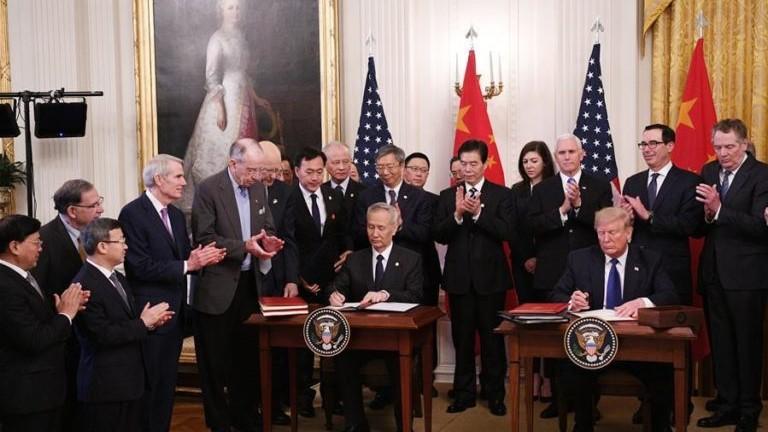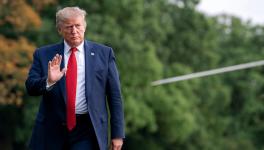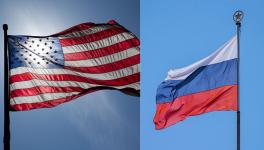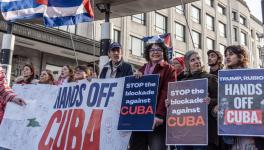Trump, the Deal Maker, Blinks Before China

US President Donald Trump and Chinese Vice Premier Liu He, sign the China-US phase-one economic and trade agreement in a ceremony at the East Room of the White House in Washington, DC, January 15, 2020.
The signing ceremony of the China-US phase-one economic and trade agreement at the East Room of the White House in Washington on Jan. 15, 2020 turned out to be a unique event. Historically, the East Room witnessed many important signing ceremonies. Notably, the signing of the Intermediate-Range Nuclear Forces Treaty was in the East Room on December 8, 1987 by US President Ronald Reagan and the Soviet leader Mikhail Gorbachev; the East Room was also the venue when President George H. W. Bush and Gorbachev signed five treaties on June 2, 1990, including the 1990 Chemical Weapons Accord.
This must be the first time that the East Room witnessed an agreement being signed by the US President and foreign dignitary who is way down in protocol. Last December, United States Trade Representative Robert Lighthizer had said that “representatives from both countries” would sign the Phase 1 trade deal agreement in the first week of January. But, evidently, President Trump insisted on signing the agreement himself, although Chinese President Xi Jinping stayed back in Beijing, preparing for a historic visit to Myanmar to “write a new chapter” in the two countries’ “millennia-old pauk-phaw friendship”.
Wednesday’s photo-op in the East Room tells a story by itself. It underscores how terribly important this trade deal has become politically for Trump, as he makes his bid for a second term in the November election.
However, the main assumption behind launching the trade war on June 15, 2018 turns out to be a bombastic notion — that the US would crush the Chinese economy. China has proven right in its reaction that both countries stood to lose and the tariff war was a road to nowhere.
In the event, after 30-month old war, the US Federal Reserve estimates that China’s economy has taken a 0.25% hit, which is no doubt significant but not lethal, as US demand for its goods fell by about a third. But on the other hand, the US Congressional Budget Office estimates that tariff-related uncertainty and costs have shaved 0.3% off of US economic growth, and also reduced household income in America by an average of $580 since 2018.
Suffice to say, the new deal halves tariff rates on $120bn worth of goods, but most of the higher duties — which affect another $360bn of Chinese goods and more than $100bn worth of US exports — remain in place. And that can only be bad news for the American public.
Economists have estimated that the costs of the trade war — more than $40bn so far — are being borne entirely by the US companies and consumers. Indeed, this excludes lost business for US exporters due to Chinese retaliation.
Through the tortuous negotiations for the new trade deal, China largely stuck to the terms it had offered right at the outset. The new deal envisages that China will boost purchases in manufacturing, services, agriculture and energy from 2017 levels by $200bn over two years.
What matters most to Trump is that that China could step up purchase of agricultural exports. Trump mentioned a figure of $50bn worth of imports of agricultural goods a year by China. But China has added the caveat that the purchases will depend on market demand.
Clearly, it was the Chinese retaliation by terminating agricultural imports from US that really hurt Trump politically, who won the White House in 2016 with strong backing from farming states. The US exported nearly $20bn worth of agricultural products to China in 2017. That figure fell to $9.1bn last year, after China imposed retaliatory tariffs of up to 25% on a range of US goods, including apples, soybeans, ginseng and cotton.
Farm bankruptcies have surged 24% across America since September 2018, a few months after US trade disputes with China led to higher tariffs on key farm goods including soyabeans, cotton and dairy. This has forced Trump to announce some $28bn in aid for farmers affected by the tariffs, leading to a ridiculous situation where 40% of farm profits this year are expected to come from federal assistance.
The protections for intellectual property was supposedly one main reason that triggered the trade war. The new deal is based on some commitments that China has made, but are they any different from its earlier promises? Equally, the new deal fails to address the issue of subsidies Beijing provides to certain industries.
Overall, it is possible to estimate that this is more a ceasefire rather than a peace agreement. And this realisation could well be the reason why Xi Jinping gave the slip to the signing ceremony. This ceasefire would hold through the year 2020 but what happens thereafter is hard to foresee. The bottom line is that the US exports have lost their competitiveness vis-a-vis China.
The main gain for Trump is the optics of the new deal, which enables him to put the trade war behind him and claim an achievement during the upcoming election campaign.
Having said that it is hard to underestimate the collateral damage caused by the trade war to the US-China relationship. The climate has become toxic as the Trump administration resorted to “maximum pressure” approach when it transpired that China was refusing to blink.
The assault on the reputation of the Chinese Communist Party headed by Xi, the US interference in Hong Kong and the situation in Xinjiang, and the cold-war style rhetoric by top US officials — in particular, at the level of the Vice-President Mike Pence and Secretary of State Mike Pompeo — crossed the red lines.
Trust, once broken, cannot be restored easily. And, to cap it, Chinese national pride and self-esteem have been wounded. Beijing has concluded that an equal relationship with the US is just not possible. China cannot and will not accept US hegemony. In the final analysis, therefore, the geopolitical consequences of the trade war are going to be far-reaching.
Get the latest reports & analysis with people's perspective on Protests, movements & deep analytical videos, discussions of the current affairs in your Telegram app. Subscribe to NewsClick's Telegram channel & get Real-Time updates on stories, as they get published on our website.























